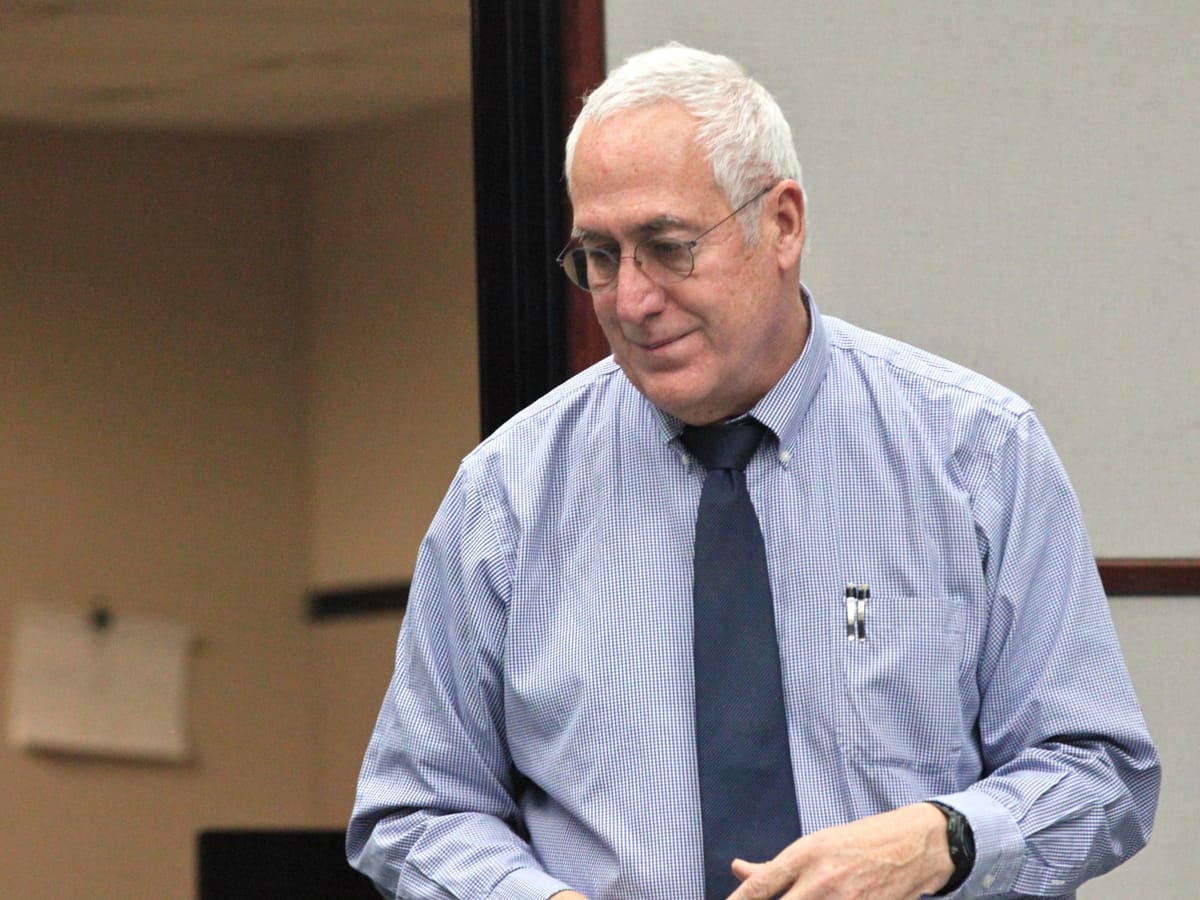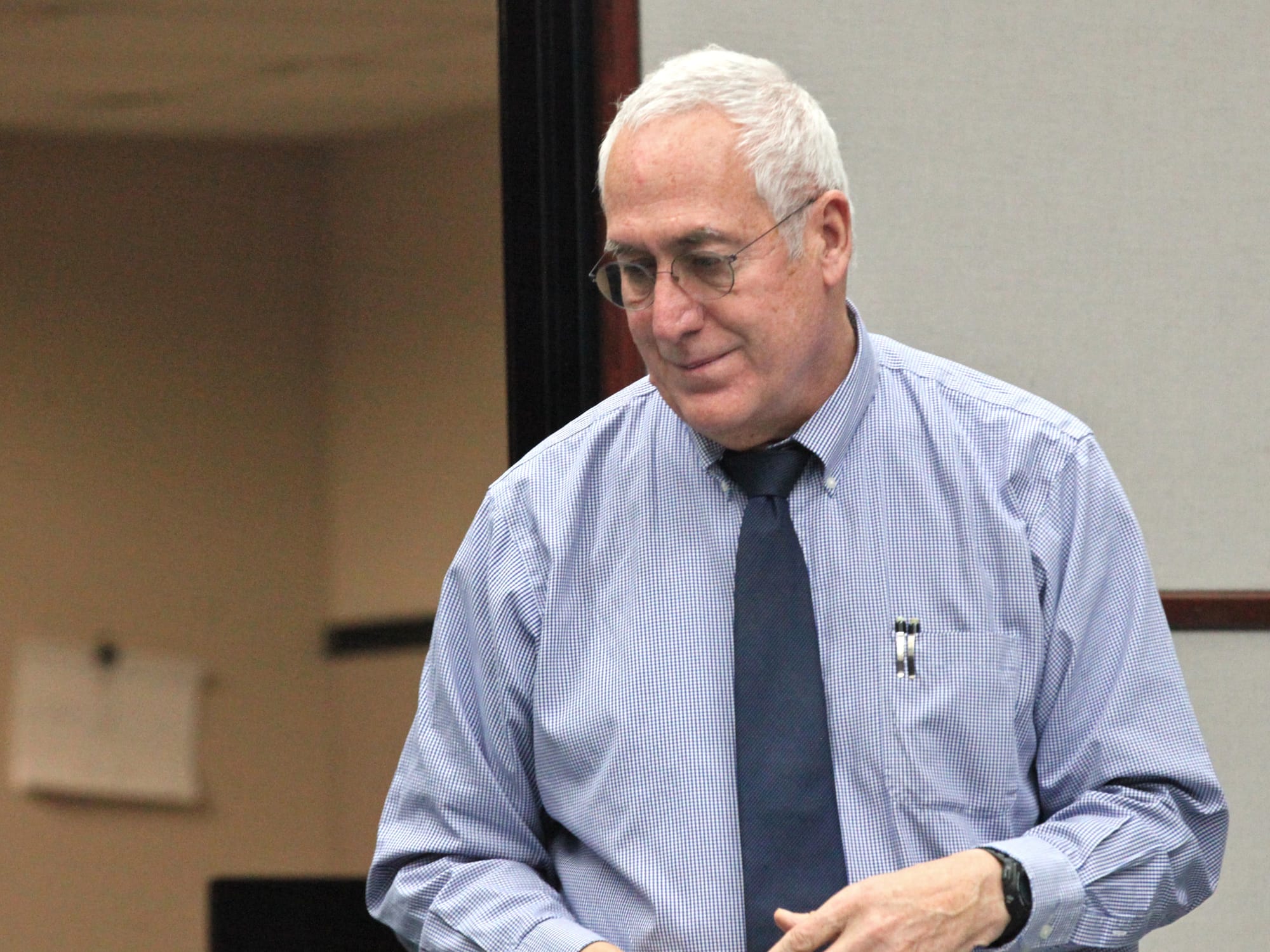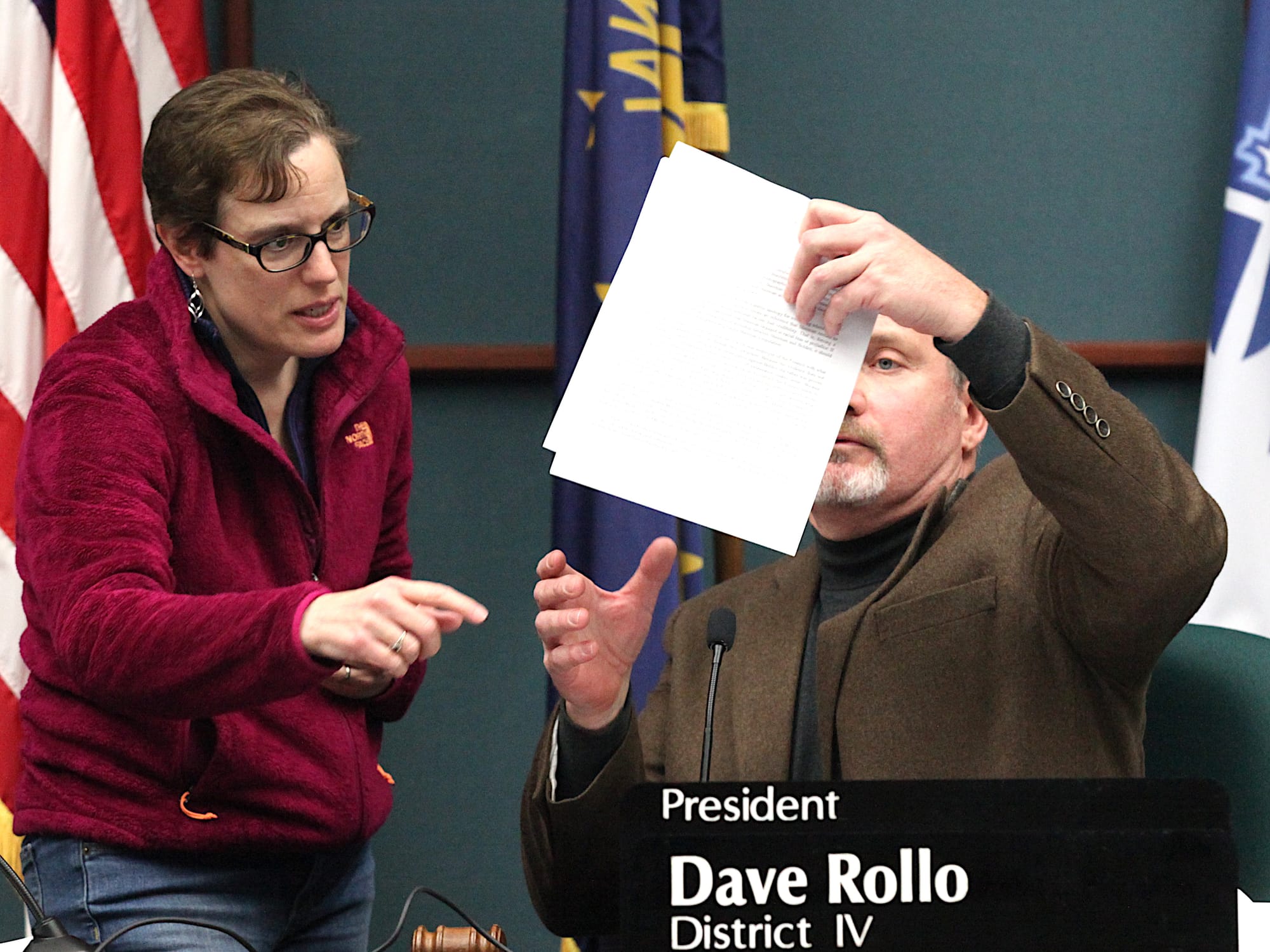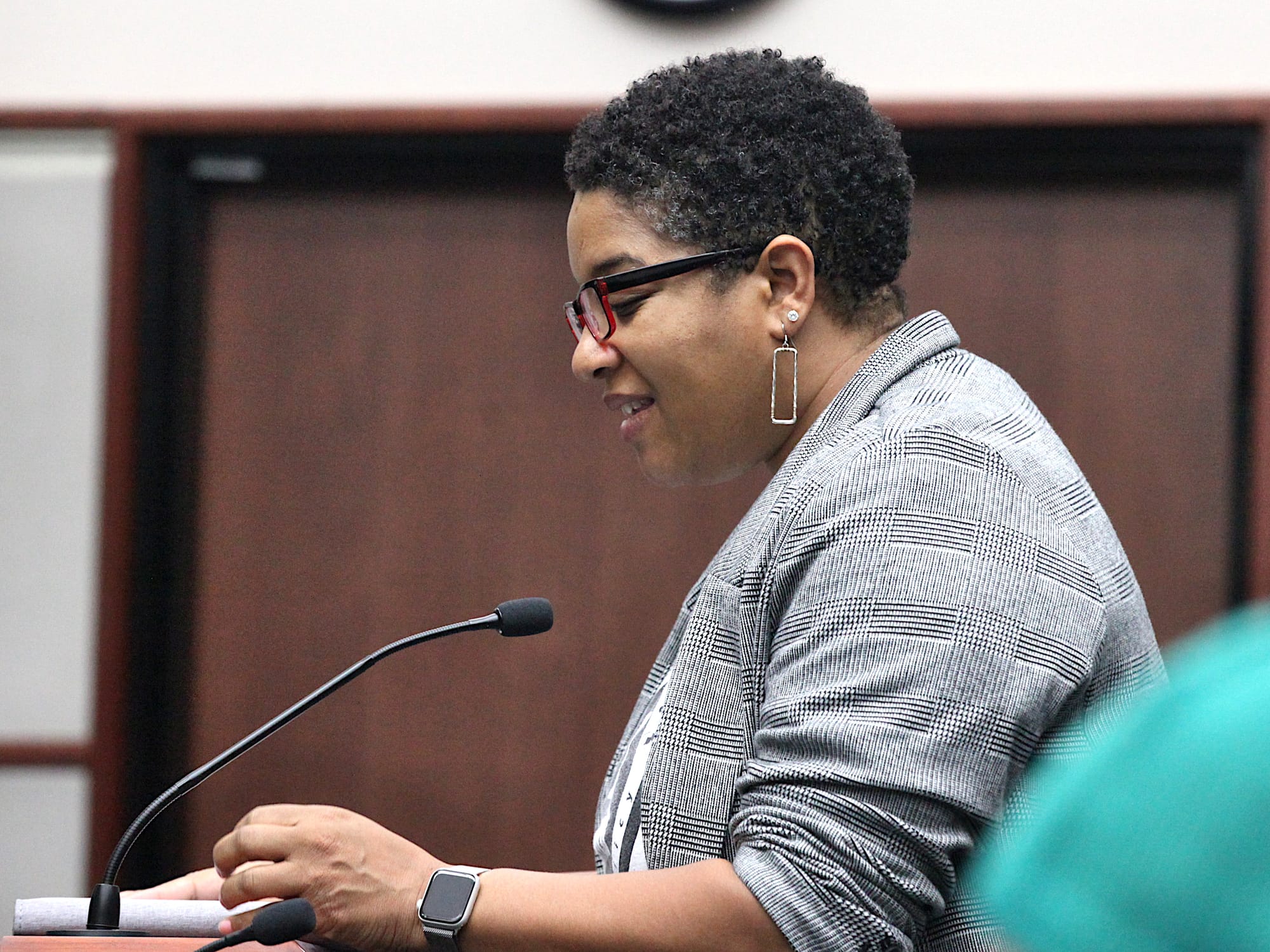City clerk’s complaint prompts investigation, decision by city council to make public a summary: No evidence of racial animus by council staffer




In early August, Bloomington’s city clerk, Nicole Bolden, filed a complaint about the city council’s attorney/administrator, Dan Sherman, alleging that he was “disrespectful and rude” in his questioning of her about the posting of required legal notices for a meeting of the council’s rules committee. Bolden, who is black, further alleged that Sherman’s behavior, who is white, may have been motivated by personal animus related to her race or some other reason.
On Wednesday night, in a vote that was split 6–1–1, Bloomington’s city council decided to accept a statement of its executive committee and approve a motion to release publicly the summary of an investigation into Bolden’s allegations. The investigation did not find evidence to support Bolden’s allegations.
Some councilmembers who voted for the motion said they did so to clear Sherman’s name.
Chris Sturbaum was absent. Allison Chopra voted against the motion. Steve Volan, one of the executive committee members, abstained from the vote.
The council’s choices for action were characterized in the investigator’s report as a “purely political decision regarding how it wants to handle Bolden’s complaint because Bolden and Sherman cannot both get what they want.”
The investigation, which was conducted by Mark Wohlford, of Bose, McKinney & Evans (BME), concluded that the evidence did not support Bolden’s claim that the meeting notices were posted at least 48 hours in advance of the scheduled committee meeting, as required by Indiana’s Open Door Law. The investigation also concluded that Sherman had acted to prevent the committee meeting from taking place in violation of the law.
It was Bolden’s job to ensure the meeting notices were posted. One of the duties of the city clerk, under the local ordinance, is to “cause all notices of regular and special meetings of the council and its committees to be served according to law…” The city clerk is an elected position. Bolden was unopposed in her re-election bid this year, and will start her second four-year term as city clerk in January.
Also according to the report, the evidence did not support a finding that Sherman was motivated by racial animus, when he questioned her about the adequacy of the meeting notice.
Bloomington’s online financial records show that the city paid BME a total of $13,078 to investigate Bolden’s complaint.
The start of the August rules committee meeting, when Sherman questioned Bolden, was covered by The Beacon with a story headlined “Bloomington city council rules committee off to rough start”
That coverage includes an audio recording and a rough transcript of the exchange between Bolden and Sherman that led to Bolden’s complaint.
The section of the investigation summary that was released to the public, by the same motion to accept the executive committee’s report, does not appear to try to decide the question of Sherman’s alleged disrespectfulness and rudeness.
An apparent allusion to the lack of a finding about the question of rudeness came in Bolden’s public statement, read aloud to the council on Wednesday. She said she received a report with details summarizing the investigation on Oct. 11, and “[s]eeing that the report did not address my actual complaint, I withdrew it on October 24, 2019.”
Asked by The Beacon, Bolden said she did not think her conversation with the investigator was fair, because he framed the issue in terms of the facts of the meeting notice issue, not addressing the question of her allegation about Sherman’s behavior as rude and disrespectful.
Councilmember Allison Chopra questioned the investigator, Mark Wohlford, about his ability to conduct such an investigation: “As a white male, I’m curious how you ensure that your cultural competency or your understanding of race relations is such that you can investigate these types of things competently.”
In response to Chopra’s question, Wohlford said, “The best I can do is to listen. Any investigation begins by listening. … The goal is to let the person who is complaining make their statements and identify any pieces of evidence or witnesses who may corroborate what they experienced.”
At Wednesday’s meeting, councilmember Isabel Piedmont-Smith drew out the fact that the investigation report was completed on September 11, which was more than a month before Bolden withdrew her complaint. So Bolden’s attempt to withdraw the complaint had come at a point when it could no longer be withdrawn, Piedmont-Smith said.
Piedmont-Smith also disagreed with Bolden’s contention, made in her statement to the council on Wednesday, that “[t]his public action after my private complaint was withdrawn is unnecessary and retaliatory.” Piedmont-Smith said that because Bolden had made her complaint at a public meeting, it had not been private. While the specifics of the complaint were not declared publicly, Piedmont-Smith said, the fact of her intent to file a complaint had been made publicly.
Bolden’s remarks made to Sherman at the rules committee meeting did not include an allegation of racial animus:
Your behavior has been reprehensible, and incredibly rude and unprofessional, and I’m tired of it. You have been snappy and nasty. …I am absolutely done with it. This is officially notice that I will be filing a complaint with HR about this behavior.
In her remarks, Dorothy Granger said that as a member of the executive committee that handled the complaint, it was not easy process. The committee had tried to be thoughtful, she said.
Granger said she was sorry that Bolden perceived the public action by the council as retaliatory. At the point when Bolden wanted to withdraw the complaint, Granger said, things had gone too far. Granger didn’t think anyone on the council wanted to take the public action, but “We felt like we had to,” Granger said.
The council’s executive committee consists of its officers: president Dave Rollo, vice president Dorothy Granger, and parliamentarian Steve Volan.
Exoneration was something that Sherman wanted, according to the investigator’s report. The advice given by the investigator, about whether council’s action on the matter should be public, was keyed to whether Bolden’s accusation was known publicly:
“[I]f it is well-known what Sherman was actually accused of publicly, a failure to clear his name of misconduct or wrong doing may open the Council up to legal risk from the other direction. The Council should consider how publicly or privately it needs to handle an acknowledgement: (1) that Sherman was correct about the notice issue, (2) that Sherman pursued it as part of his job duties, and (3) that the evidence does not support that Sherman was motivated by racial animus or discrimination.”
The idea that Sherman stood accused of racial animus, in a way that was known publicly in the community, factored into the thinking of some councilmembers when they weighed whether public action by the council was warranted.
Councilmember Andy Ruff said the complaint was not private. “Word had gotten out into the community, certainly all through city government,” Ruff said. That put Sherman in a “horrible position,” where his reputation was at stake, after serving the city for nearly 30 years, on the verge of retirement, Ruff said. A “secret report” as an outcome would have been “completely inadequate,” Ruff said. There needed to be a public record that absolved Sherman, Ruff said.
Rollo agreed with Ruff that “the word was out, people in the community were aware of it.” Sherman has an exemplary record, Rollo said, and supported Sherman’s request for public exoneration. Rollo also said Sherman, in questioning Bolden, was defending the interests of the city council with respect to conformance with Indiana’s Open Door Law (ODL).
Under the ODL, it’s not just entities like a city council that are subject to noticing requirements. Entities subject to the law include: “Any committee appointed directly by the governing body or its presiding officer to which authority to take official action upon public business has been delegated.”
The rules committee was reconstituted by city council president Dave Rollo at the council’s June 12 meeting. Rollo named councilmembers Steve Volan, Isabel Piedmont-Smith and Jim Sims to the committee and Nicole Bolden as an ex officio member. About the committee he stated: “The goal is to reconsider council processes and make them more efficient and effective.”
In his remarks, councilmember Jim Sims called Bolden a “dear friend” and Sherman “the absolute best support and help” that he’s had since he joined the council in August 2017. So it was difficult for him to digest and the allegations, he said. Sims said he respected the process.
Sims addressed the issue of “racial animus,” saying that he’d been contacted by the investigator, because he thought he was the only other person that could corroborate, or not, the allegations. (Sims is the only black member of Bloomington’s city council.) Sims said that he could not speak to what Bolden had experienced, but indicated that he had not experienced racial animus from Sherman.
During Wednesday’s meeting, Rollo said that the executive committee had concluded that Sherman was the “aggrieved party” in the complaint. That conclusion influenced how the council handled the matter. Rollo said the prepared statement he’d read aloud was something Sherman had requested. Asked by The Beacon after the meeting who wrote the statement, Rollo said it was Sherman’s attorney who provided it.
The statement says that the investigator was supposed to investigate the “truthfulness” of Bolden’s claim that the rules committee was timely posted. At the rules committee meeting, Bolden said she relied on an assurance from her staff [apparently Nico Siegler] that he had posted the notices on Thursday evening as required.
Rollo told The Beacon after the meeting that he did not disagree with the possible implication in the statement he’d read aloud, that Bolden had not been truthful in her claim—about relying just on Siegler’s assurance for her judgment about whether the notices had been posted Thursday evening as required. That’s because of the security camera footage on Friday morning cited in the investigator’s report, Rollo said. The footage is described in the report as follows:
The video shows Bolden entering the building around 8:40 a.m. on Friday, August 2nd, immediately looking at the atrium / main lobby stand, entering her office, and Nico [Siegler] returning with a paper (presumably a notice) and putting it in the atrium/main lobby stand.
The “lobby stand” is a flip book where meeting notices are typically inserted, in addition to postings made at various bulletin boards throughout city hall. Responding to an emailed question from The Beacon, the city’s corporation counsel, Philippa Guthrie said that inclusion in the flip book alone would be adequate to satisfy the ODL requirement for posting notices.
At the city council’s Wednesday meeting, Siegler approached the public podium and attempted to speak, over the admonishment from Rollo to wait until Wohlford had answered council questions. Siegler said, “I just want to take this moment to apologize to the clerk for any action [indiscernible] that has led to this event.”
A suggestion from the investigator in the summary was to pursue additional investigation, if the council was going to consider a public resolution on the issue:
If the Council is considering a publicly adopted resolution on this matter, it may want to know with certainty whether Bolden actually relied upon Nico’s representations or if Bolden directed Nico to post notice with the knowledge that it had not been properly posted. Confronting Nico [Siegler] and/or Bolden with the video evidence seems like the most viable action for ferreting out the truth and seeing if Nico and Bolden provide the same explanation.
Rollo told The Beacon that the executive committee had not wanted to pursue the investigation further.
Steve Volan, who chaired the meeting of the rules committee that gave rise to Bolden’s complaint, said he’d concluded about the council’s action that “it was unfortunately and unnecessarily so public.” He added, “It should have been resolved behind the scenes.”
Volan also pointed out an irony: The incident that gave rise to the complaint originated from a committee that was designed to address issues that included personnel matters, among other things.
“I find the entire affair excruciating,” Volan said. In his time on the council—it’s more than a decade and a half—it was one of the most problematic situations he could recall. That was a sentiment echoed by Andy Ruff and Dave Rollo, whose length of service is even longer than Volan’s.
Susan Sandberg said that even though it was unfortunate, “due process” had been followed.
In his remarks about the process, Volan said “There was no process in place for what happened. This event was unprecedented, and we, as a council, were not prepared for it. … We were forced to created a process on the fly, which we did, … it was arbitrary and made up on the fly. I think the process was thorough and I think everyone worked in earnest to resolved the situation.”
Allison Chopra thought the executive committee had done a good job up until the part where they decided to make a public issue of a private complaint. “To me, the punishment doesn’t fit the crime, at all…Surely there’s a remedy here short of what we did this evening,” she said.
In their comments, some councilmembers looked to the future. Sandberg said, “It is my wish from this point forward that all the parties involved can continue to work professionally and respectfully with one another as would anyone in positions of leadership and decision making can do.”
Volan said he thought the entire affair was “a series of misunderstandings” but was looking for a way to “put it behind us.”
Volan had the final word before the council’s vote:
…[L]et’s not pretend that we were prepared for this or that we couldn’t have addressed it better. I’m not commenting on the virtues of the people involved. But as far as this body goes, we have a lot to address, a lot to make up for. I hope we can do that in the New Year.




Comments ()